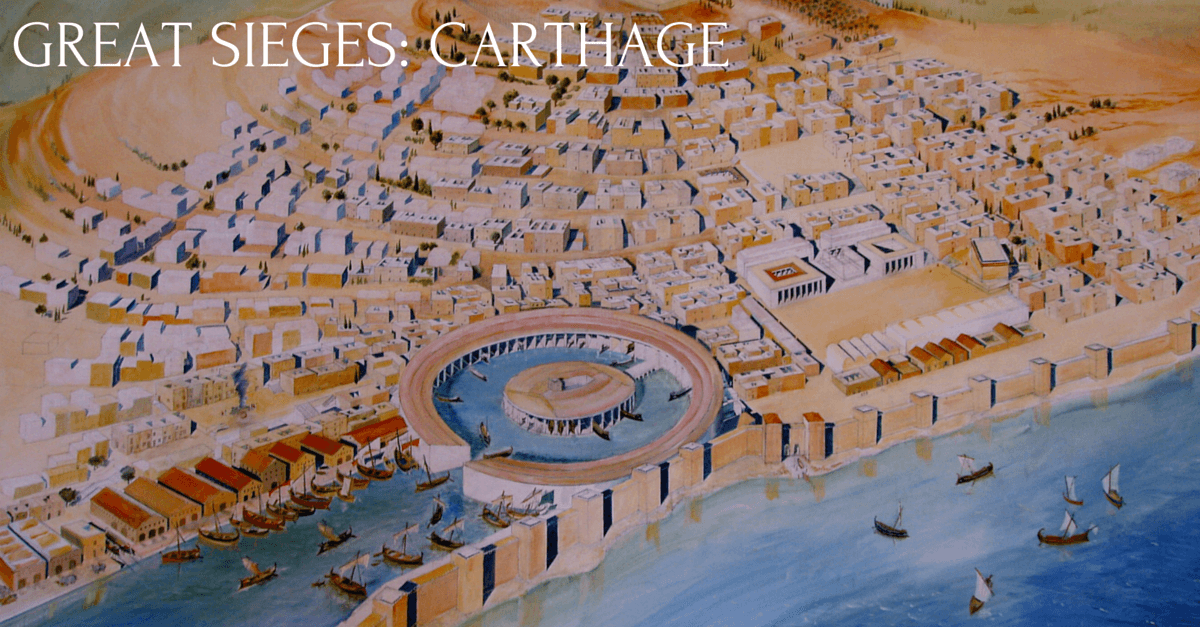The Siege of Carthage makes for quite a sad story when put into context. A proud trading empire fights two long wars, only to lose both and pay for it dearly. Their enemy now controlling far more territory, the Carthaginians bend to their will and even offer to pay their fifty years of war reparations after only a decade. Once the city started to get a taste of freedom and a hint of the commercial power coming back, they were invaded and crushed by their much more powerful enemy. Within a few generations, the great empire of Carthage withered and finally died in a massive assault on the city.
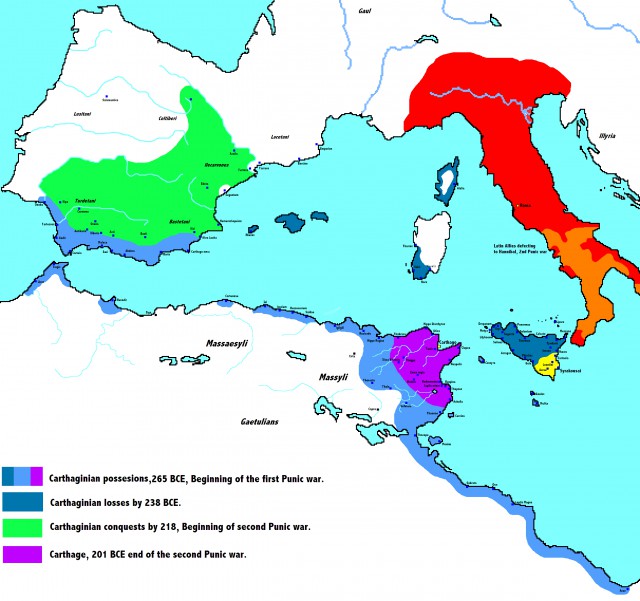
After the Second Punic War the Romans enjoyed a long period of glory. They had won a great victory over a formidable foe and had trained and promoted many young soldiers and officers and there were legions full of men who had battle experience. The Romans took advantage of this and fought several wars in the fifty years before the Third Punic War. The Roman holdings grew considerably but Carthage was also beginning to reemerge as a local power. After the fifty year war debt was paid off the Romans began to grow suspicious of Carthage. Wary of how soon they had the capacity to pay off their debt and the memories of the terror of Hannibal prompted some, including the outspoken senator Cato, to call for Carthage to be destroyed once and for all.
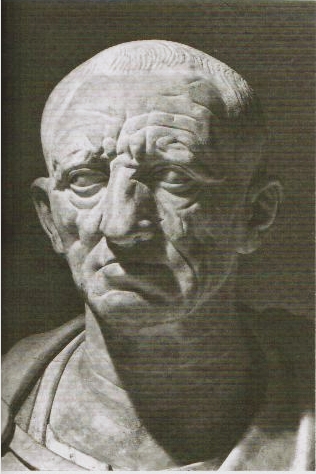
The Romans, once they generally accepted that Carthage could not be around anymore, started looking for ways to start a “just” war. They found it in 150 B.C.E. Masinissa, now well into his eighties, had taken advantage of the relative weakness of Carthage and begun seizing chunks of Carthaginian territory claiming it once belonged to his people. The Carthaginians finally had enough and sent an army against the Numidians under the command of Hasdrubal. Hasdrubal was unsuccessful in his attack and was held in Carthage and condemned to death as was normal for Carthage.
The Romans used this as their excuse to go to war Carthage but they were cautious, smart and cruel in their lead up to declaring war. Still frightened of the city, the Romans were determined to weaken the future defenders as much as they could. The city of Utica, upon seeing what could likely unfold, surrendered and pledged allegiance to Rome. Romans demanded the surrender of 300 hostages of prominent politicians in Carthage. Despite the Carthaginians meeting this demand the Romans sailed to Utica with somewhere around 45,000 men. Upon reaching Africa the Carthaginians sent out envoys to two Roman consuls Manius Manilius, who commanded the army and Lucius Marcius Censorinus who commanded the fleet. The consuls demanded that Carthage hand over all of its arms and armor. The Carthaginians nervously complied with the demand and handed over huge amounts of weapons and armor. As the last load of weapons was given to the Romans they sent envoys back with the demand that the people of Carthage must abandon their city and settle anywhere else so long as it was at least ten miles from the sea. They were informed that Carthage would be razed however the shrines and cemeteries would be preserved. This was unacceptable for the Carthaginians and they shut their gates and resolved to fight rather than being led around like cattle.
Carthage had already been put at a huge disadvantage as the majority of their weapons and armor were taken and they had recently lost a large battle against the Numidians. Nevertheless the citizens of Carthage rallied together and killed any anti-war parties in Carthage as well as any unlucky Italians who happened to be in the city. Men, women and even children worked to forge new weapons and to strengthen fortifications around the city. Appian says that the women even sacrificed their hair for the tension fibers needed for the catapults.
Despite the initial setbacks, Carthage was not going to fall easily. Carthage was one of the most heavily fortified and naturally defensible cities in the ancient world. The city was located at the end of a peninsula and had naturally protected military and civilian harbors. The only side of the city approachable by land was protected by huge walls thirty feet wide and fifty feet high with towers dispersed evenly about every two hundred feet. Within the walls was space for 300 elephants, 4,000 horses and barracks for 20,000 soldiers. In front of the walls was a sixty foot ditch and a wooden palisade. The Romans quickly discovered that the Carthaginians were more than ready for an assault. Before even setting up camps, the Romans attacked the walls with the army going against the triple line of palisade, ditch and walls stretched across the isthmus and the navy throwing up ladders against the weaker side of the wall that led into the sea and the harbor.
The attacks faltered under a hail of missiles. The consuls tried again soon after only to be repulsed once more. There were simply too many obstacles to get through under such heavy missile fire. The Carthaginians had an army outside of the walls led by Hasdrubal, possibly the same one condemned to death who had escaped, or perhaps a different Hasdrubal, who had gathered a fairly large army. This convinced the consuls to build camps before they tried another assault. The third assault was also a failure for the Romans as Manilius was only able to cross the wooden wall and fill the ditch before retreating with heavy losses. The consuls then decided to build two very large battering rams one manned by soldiers the other by marines. It soon became a competition between the two of who could breach the walls first. Both of the rams were successful in breaching the main wall. The Carthaginians were able to push the Romans back and repair the walls. Under cover of darkness a group of Carthaginians went out and set fire to the rams and succeeded in destroying their functionality despite resistance from the Romans. This type of behavior shows how brave and determined Carthage was and also showed that they were planning the defense of their city intelligently, as this was a risky but high reward operation. The Carthaginians had withstood a fierce early onslaught and had early successes to raise the whole city’s morale.
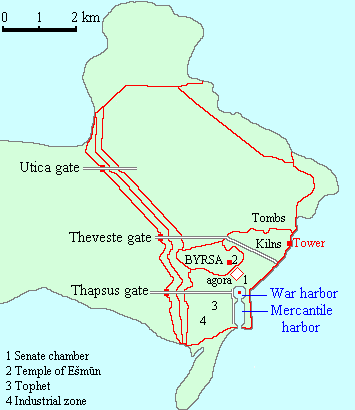
The next morning the Romans discovered that the breaches they had made still appeared practical and assault parties were hurriedly organized and sent through a gap in the wall. The assault initially succeeded however thousands of citizens took to the roofs and rained missiles on the Romans. This is where the Romans finally showed some promise from their officers, who had performed poorly so far. Scipio Aemilianus, a military tribune, who had earlier arbitrated disputes between Carthage and Numidia, realized that the assault party was overzealous and stationed his men at the breach and organized a successful retreat when the assaulting party became bogged down. By doing so he prevented a full collapse of the assault which would have led to the loss of nearly every soldier within the walls.
Scipio Aemilianus had gained a reputation for bravery with enthusiastic pursuit of the enemy after the battle of Pydna as a teenager and he later killed an enemy in single combat in Spain. He was adopted into the Scipio family by Africanus’ son Publius Cornelius Scipio. This left him with high expectations as he was looked upon to continue the glory of the Scipiones. He was one of the few competent officers at Carthage and he began to be noticed by his superiors as well as the masses in Rome.
Later Censorinus’ camp was moved to the isthmus which separated the Lake of Tunis and the sea and led up to the slightly weaker section of the wall. The Carthaginians seized every opportunity to unleash fire ships on the coastal Roman camp and later assaulted the camp at night, surprising the Romans. Fortunately for the Romans, Scipio was in that camp. He recognized the problem, took a group of cavalry out of the opposite gate and flanked the Carthaginians, driving them back to the city with heavy losses. Censorinus subsequently fortified his camp and took the opportunity to fortify the seaside beach landing as well.
Though it can be argued that some of the sources such as Polybius are biased towards the Scipio family, Scipio continued to be the only one achieving renown as an officer, and maintained such order over his men that they were the only ones who were not attacked while foraging. As winter approached the Romans under Manilius went south to forage. Hasdrubal had been camped in the area and took a fortified position in the city of Nepheris which Manilius hoped to assault. Scipio opposed this because the approach to Nepheris was across a river and up a hill. Manilius was still set on attacking and his army paid for it as they were halted on the hill after already crossing the river. They were bottled up between the summit of the hill and the river; Hasdrubal knew it and attacked down the hill with vigor. Once again Scipio rescued the army, taking around 300 cavalry and leading them on a series of controlled charges allowing Manilius’ army to escape across the river.
The battle was a disaster for all but Scipio who continued to gain fame and popular support in Rome, likely aided by the fact that he was a Scipio and many people began to believe that the Scipio’s were blessed by the Gods in battle especially in Africa. Scipio went back to Rome during the winter and was nominated for the consulship despite being a few years shy of the legal age. There was some opposition to this by some prominent politicians but the matter was put to a popular vote which Scipio won without any problems. He was allowed to raise an army and take with him any volunteers of which there were quite a few. This was very reminiscent of Scipio Africanus’ invasion of Africa in which he also received a great number of volunteers.
As Scipio was on his way to Utica the Propraetor Mancinus, who was in charge of the Fleet around Carthage at this time, found a weak spot in the walls and attacked. The Carthaginians rushed out of a nearby gate to disrupt the attack but were pushed back through their gate. Mancinus noticed the open gate and had every man who was near rush into the city, in all there were 3,500 men and only 500 were fully armed. The hastily assorted assault party was in a dire situation and the defenders threatened to slaughter them if they attempted an unsupported retreat. Mancinus sent out pleas to both Piso, the most recently appointed consul in command of the army, and to Utica where Scipio had just landed.
Scipio received the message and acted immediately. He sailed to Carthage with orders that men fill the decks of the ships. When he was in sight of the city the Carthaginians exercised caution after seeing threats on multiple fronts and Mancinus was able to get his men out. Scipio saved the day once again. Scipio, upon settling in, took stock of his army and realized that they were not meeting his expectations. Realizing that he did not quite have time to retrain his army, Scipio simply tightened discipline in the camps and expelled all camp followers who were nothing but distractions to the men.
Scipio decided to make his own attempt at assaulting the city. He sent two parties to separate parts of the wall during the night. Despite initial confusion the defenders were able to push the Romans back. The Romans then found a deserted tower just outside the walls which they took and laid planks across to reach the walls. They were able to secure a gate in this way and Scipio and 4,000 men entered the city causing all the defenders to withdraw to the fortified Byrsa. Unsure of his men’s safety on the winding, unfamiliar streets, Scipio withdrew.
Hasdrubal, now in the city, decided to make a statement to both the Romans and his own people. He took the Roman prisoners he had and savagely tortured them on the walls in plain sight of everyone and then threw their bodies off the walls. This was an attempt to show the Romans the resolve of the Carthaginian defense as well as a message to his people that there was no chance of peace with the Romans. This idea backfired on Hasdrubal however as the people of Carthage were disgusted by Hasdrubal’s actions and their morale actually dropped.
Scipio then attempted to cut off all sources of supply to Carthage. He had his men construct a series of ditches and a rampart cutting across the isthmus. He included towers in the rampart including an especially tall one to observe the city.
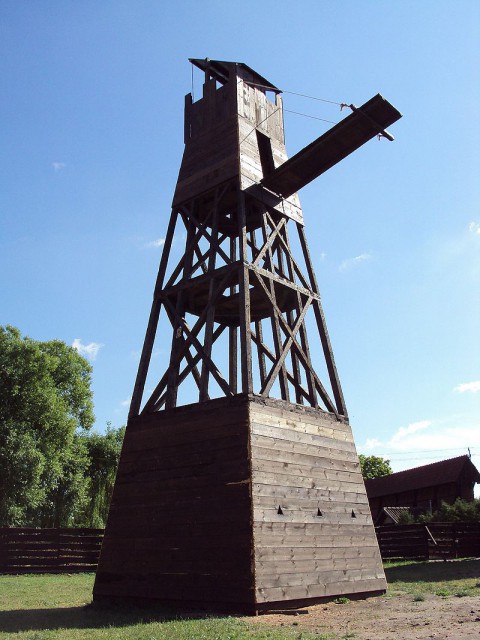
That was the easy part for Scipio. The great harbor was still open for supplies. Scipio started construction on a mole which would cut across the opening to the long, narrow harbor. While the defenders failed to stop the construction across the isthmus they were determined to keep the sea route open. The whole of Carthage put in an effort to construct a fleet and cut out another harbor exit. Under cover of darkness they were able to complete the project and send out their recently constructed fleet before the Romans fully realized what they had done. After a pause where the Carthaginians became familiar with their new ships, they attacked the blockading Roman fleet. The Carthaginians inflicted heavy damages on the Roman ships, many of the smaller Carthaginian ships were able to sheer the oars off the larger Roman ships. Despite the success the Carthaginians were eventually forced to withdraw and the Roman blockade was complete.
Scipio would not wait for the city to starve however. He was determined to take the quay of the harbor, the peninsular strip of land which naturally protected the harbor. After setting up several siege engines and constantly barraging the wall opposite the quay, the bravest men of Carthage swam naked to the quay in the dark with unlit torches which they then lit and set most of the Roman equipment on fire. This attack startled the still undisciplined Romans and most ran. Scipio rode up with a contingent of cavalry and cut down any Roman who refused to rally, something not entirely uncommon for the period. Devising a new plan, Scipio started construction on a wall on the quay which would reach the height of the Carthaginian walls across the harbor.
It wasn’t until the next spring when the attack on the city was renewed. Scipio had successfully gone south and taken Nepheris which caused most of the area to surrender. With security in the region full focus was on the assault. The main assault would be concentrated around the harbor and both Scipio and Hasdrubal knew it. Hasdrubal attempted to fortify the outer commercial harbor while setting fire to some of the outer warehouses. What he did not notice was Caius Laelius leading a group of Romans into the inner military harbor and securing the fortified area leading to the forum.
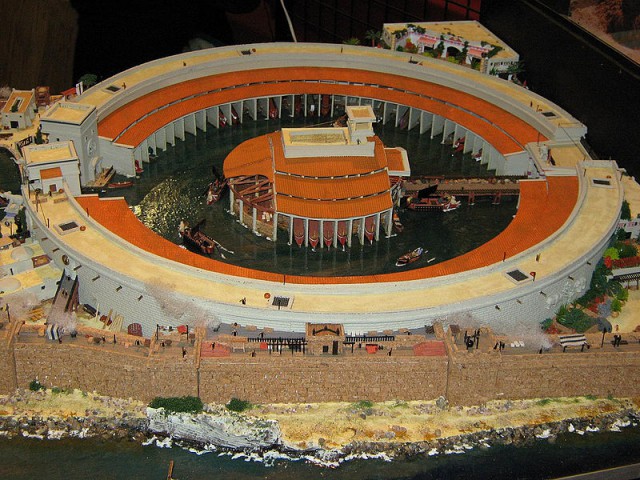
The push into the inner military harbor gave access to multiple parts of the city and secured an entrance over the sea wall. The Romans were able to funnel troops in over the sea wall and were able to push to the forum before nightfall. By achieving an established and organized hold on the harbor area the Romans were able to stay in a defensible position through the night. The next morning Scipio urged the men to push forward but was held up by his own men, who had stopped to loot the temple of Apollo in the Agora. These men would later miss out when the rest of the loot was distributed and it showed how undisciplined the men still were. After the temple was clear the Romans pushed forward towards the fortified inner-city Byrsa.
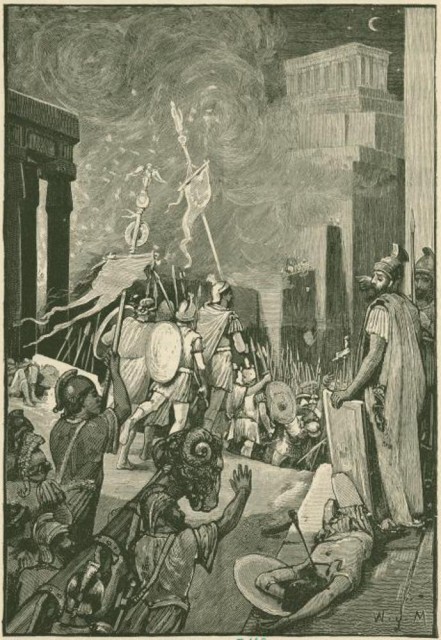
Six days of viscous street by street and house by house fighting ensued with throngs of missile throwers on the rooftops and the Romans taking the houses and coming up underneath them. Many of the avenues were lined with apartment buildings up to six stories tall. Rows of houses were burned to make wide avenues to feed more men in. many civilians were killed during this stage, many by accident due to fire or missiles but many were killed due to the fervor of the Romans who could finally see victory ahead. Aside from burning many buildings were toppled if possible simply to remove the archers on top. The Roman officers did their best to rotate fresh troops in throughout the days but the Carthaginians had no rest and fought for their lives day and night.
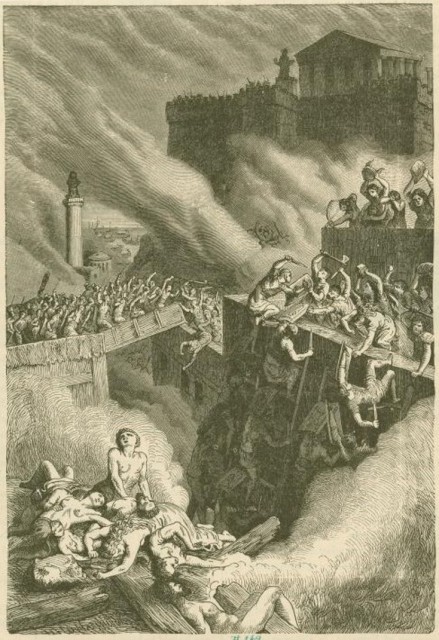
After six days the Romans were preparing to assault the Byrsa when a delegation came to surrender. The Romans accepted the surrender of around 50,000 citizens but refused to negotiate with the 900 or so deserters. These men would eventually commit suicide but the heavily disliked Hasdrubal surrendered to the Romans amidst this turmoil. This act supposedly was the last straw for his wife who was said to publicly shout at her husband before taking her children and throwing them and herself into a burning temple. Hasdrubal would live out the rest of his life in Italy.
So ended the trilogy of the Punic Wars which had caused much devastation and loss of life through many generations and set the Romans on the road to Mediterranean domination. Scipio would later gain more fame by taking the stronghold of Numantia in Spain. Scipio was also given the name Africanus and given a triumph at Rome. There is no evidence of the Romans sowing the area of Carthage with salt and a Roman colony was later established on the same location by Julius Caesar and thrived until its capture by the Vandals in the 5th century AD.
By William McLaughlin for War History Online
